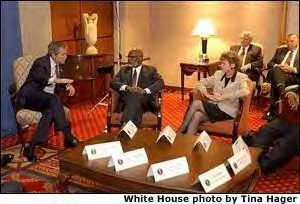

|
|
|
The White House The Federal Reserve |
Introduction
Task Process Resources
Evaluation Conclusion
The United States has been in a recession for almost a year. After experiencing the longest period of economic growth in U.S. history, citizens who are not accustomed to poor economic conditions are getting panicked! They need to see better economic conditions start to develop before they lose all confidence in our system. Unemployment should be reduced to a level below 5%. Gross Domestic Product should show moderate growth of at least 2.5 to 3%. Inflation should not creep up to 2% or higher.
Many people have started to blame the President for not fixing our economy and restoring consumer and business confidence. He has his Council of Economic Advisors searching for fiscal policy initiatives.
Alan Greenspan, Chairman of the Federal Reserve Board, is making sure the Regional Fed Bank Presidents are preparing reports on economic conditions around the country in preparation for the next policy meeting in Washington, D.C. Monetary policy has been given high praise for saving our economy in the past and maintaining a long period of economic growth.
 |
As members of the Federal Reserve Banking system, you should be able answer the following questions:
 |
| President George W. Bush discusses the economy with Walter Howlett Jr. of Booker T. Washington Insurance Co. and Kathy Jones of Honda Manufacturing during a roundtable meeting on the nation's economy with business leaders in the Ayls Stephens Center at the University of Alabama at Birmingham Monday, July 15. |
As members of the Council of Economic Advisors, you should be able answer the following questions:
The final product for both monetary and fiscal policy advisors will consist of two components:
Three days will be spent on research during class time. All other research must be completed on your own time. You are expected to spend at least an additional two or three hours at home or in a computer lab acquiring the needed data and preparing this presentation.
Click here to
access a student worksheet that you can modify to suit your needs .
Data will be collected and organized by all pairs on the following economic conditions in the United States and their area:
Data will be collected and analyzed by the Federal Reserve Bank District pairs on all of the following:
Data will be collected and analyzed by the Council of Economic Advisors on all of the following:
Suggested web links to use: For more help in knowing what to use for each of the roles, see Resources section below.
The Federal Reserve: Members of the Board of Governors
The Federal Reserve System- Purposes and Functions
Federal Reserve Districts and Banks
Presidents of the Federal Reserve Banks
Federal Reserve System- Federal Open Market Committee
Summary
of Commentary of Current Economic Conditions by Federal Reserve District
(Beige Book)
Monetary Policy Report to Congress
About Economics (a commercial site with economic data for both groups)
Bureau of Economic Analysis- Regional Accounts Data
U.S. Census Bureau- Census Economic Briefing Room
U.S. Department of Commerce- Economics and Statistics Administration
In addition to using the web sites that have primarily statistical data, you may find it helpful to read articles about the economy in:
If you are unable to access some of the sources listed above, you may of course use the print versions of newspapers and magazines!
You should also consult your text book when ever necessary to help with your policy analysis.
Roles:
Students will be working in pairs and must submit their
written reports based on the data they were assigned to collect. The five
minute presentation should consist of both students presenting for as equal a
time as possible. Students are graded on both their research and the
coordination of the combined research presentation. Students in each pair
must work together to use the data that was accumulated to make valid
recommendations on monetary and fiscal policy.
| Federal
Reserve: Role One
(there will be 6-12) Member of the Federal Reserve Federal Open Market Committee Reporting on District economic conditions. |
Federal
Reserve: Role Two
(there will be 6-12) Assistant to the Federal Reserve FOMC member Reporting on all current U.S. economic conditions.
|
| Economic
Advisors: Role One
(there will be 3) Council of Economic Advisors Fiscal Policy advice summary. Prepare budget and taxation recommendations and their analysis. |
Economic
Advisors: Role Two
(there will be 3) Regional Economic Analysis Provide economic statistical analysis for major U.S. regions for the Council of Economic Advisors
|
Resources:
Students
are strongly encouraged to use the following resources rather than search for
others. If there is a problem locating data on these sites, do not
waste any time- tell the teacher and get some assistance.
Many times you must look at various lists of what is available on each site. Not all information that you need is on the page that opens first.
Evaluation:
All students are encouraged to consult the rubric that will be used to be sure that completed work will meet the required criteria for a satisfactory grade of an A or B. Striving for anything lower than a B is not acceptable work in this class.
Rubric Click on the word "Rubric" to view your grade categories and their descriptions.
As a culminating activity, answer the following questions and be prepared to discuss them in class:
1.
What is the most difficult problem facing the U.S. economy? Why?
2. Which agency or entity is best suited to handle serious
economic problems? Why?
3. What changes would you make to the process we currently
use (fiscal and monetary policy) to influence the economy?
4. How would
you improve our current system?
Introduction
Task Process Resources
Evaluation Conclusion
Created By:
Karen
E. Wassman
Social Studies Teacher
Quince Orchard High School
Montgomery County, Maryland
Last updated September 10, 2002